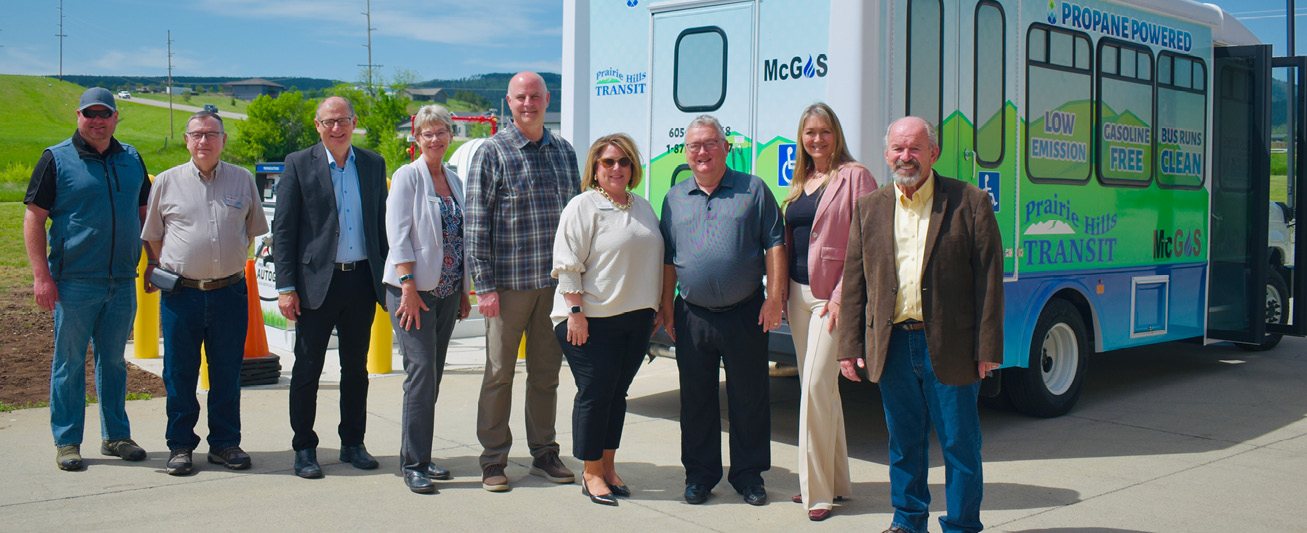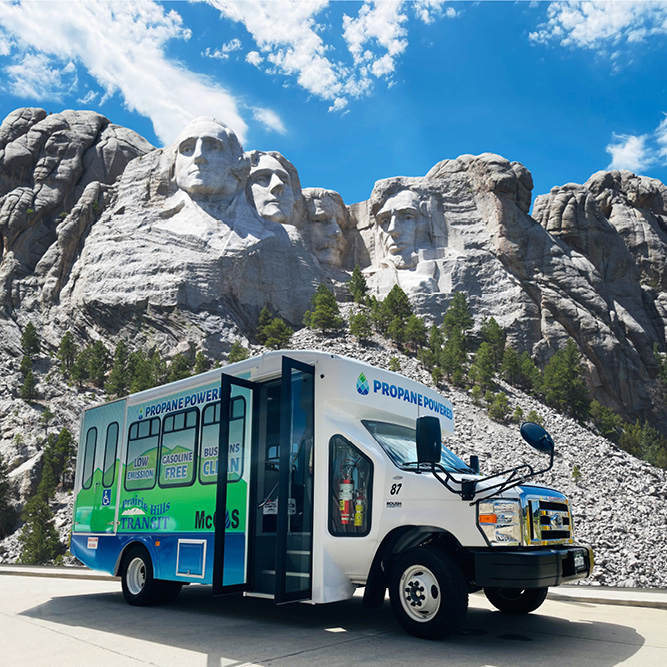
In May, two South Dakota transit agencies unveiled the state’s first-ever propane buses. The joint event in Spearfish, South Dakota, brought more than 50 community members, lawmakers, regulators and reporters to celebrate a new era in clean public transportation for South Dakota. Guest speakers included the mayor of Spearfish and Joel Jundt, the secretary of transportation for the South Dakota Department of Transportation.

Attendees were able to view a fuel demonstration and ride in one of the new vehicles. The event highlights a significant shift in the transit industry away from diesel and gasoline toward vehicles powered by environmentally friendly alternative fuels.
Prairie Hills Transit
“Prairie Hills Transit is on the cutting edge of public transit operation with these new propane buses and propane fueling infrastructure,” said Barbara Cline, executive director of Prairie Hills Transit in Spearfish, South Dakota. “We’ve done extensive research and believe that the use of propane is an excellent way to reduce emissions.” Prairie Hills Transit will operate six propane vehicles, which is 10% of its overall fleet.
Prairie Hills Transit purchased six Turtle Top Terra Transit vehicles from Davey Coach. The Ford E-450 cutaway chassis are powered by ROUSH CleanTech propane engine technology. Prairie Hills elected to install an on-site propane fueling station. Through a bid process, local propane provider McGas Propane was selected as the fuel supplier.
“Between our bus company and the propane team, we believe we’re working with some of the best in the business. Their confidence has served to help walk us through many of the processes that are new to us,” said Cline.
People’s Transit
Five hours away in Huron, South Dakota, People’s Transit will operate six propane transit buses with seating for 12 ambulatory and two wheelchair passengers. People’s Transit partnered with local fuel provider Stern to supply the fuel. Because Stern is directly across the street from People’s Transit, the agency elected not to install on-site fueling infrastructure and will instead fuel up directly at Stern.
“The new propane vehicles will have a positive impact on the environment because they reduce harmful emissions, especially when compared to our gasoline and diesel vehicles,” said Gayle Kludt, executive director of People’s Transit. With this adoption, People’s Transit is transitioning 80% of its in-town fleet to propane.
Protecting Delicate Budgets
The financial benefits from the move to propane are tangible and immediate, putting the agencies in a better financial position to serve their communities well. The Ford E-450 cutaway chassis with ROUSH CleanTech propane engine technology is the only propane vehicle that has completed the Federal Transit Administration’s New Model Bus Testing Program: Altoona Testing. This designation allows transit agencies to access federal funds with a local match. Additional funding incentives from the alternative tax fuel credit and propane providers help keep fuel costs low.
The agencies will also experience immediate savings in fuel costs. Through its partnership with McGas Propane, Prairie Hills Transit is paying $1.77 per gallon of propane (including tax and delivery), while the rate for gasoline is $2.52 per gallon and the rate for diesel is $3.57 per gallon.
Model for Statewide Leadership
The move to propane by People’s Transit and Prairie Hills Transit has created a buzz across the state. The communities, which both have populations under 15,000, are very much connected to their local services. As a representative from ROUSH CleanTech, I had the privilege of witnessing this strong community connection firsthand.
While in Spearfish, I met a longtime rider with Prairie Hills. He was thrilled about having access to clean buses and clean air because he uses the routes for everything from doctor appointments to grocery store trips. I heard countless stories of riders and residents who care deeply about the local services they rely on, and they are eager to know that their local government agencies are making environmentally and fiscally responsible choices that enhance and strengthen their communities.
Vehicles that run on propane autogas emit fewer greenhouse gases, smog-producing hydrocarbons and particulate emissions than conventional fuels. The new buses are 90% cleaner in nitrogen oxides than the Environmental Protection Agency’s most stringent emission standard.
Healthy, Reliable & Trustworthy Services
Although these are the first in the state of South Dakota, there are dozens of transit agencies across the United States operating propane buses, making propane the leading alternative fuel for the industry.
Propane is an excellent alternative fuel for South Dakota for many reasons. Many local community members already use propane on their farms and ranches, so they’re familiar with the fuel’s reliability. Transit agencies like Prairie Hills Transit and People’s Transit are required to cover large geographic regions, and propane vehicles have a very long range. State agency vehicles must navigate harsh and brutally cold weather conditions; propane can easily start up in temperatures up to -40 F. Being able to rely on these buses is essential to building and maintaining trust among community members.
Seamless Propane Autogas Fueling Is Key to Broward County Transit Success
Broward County Transit, Florida’s second-largest transit system, was the recipient of a Propane Education & Research Council (PERC) 2024 Energy for Everyone Hero Award, presented May 29. Broward County Transit’s propane autogas fleet includes 297 paratransit vehicles — nearly 90% of its entire fleet. An additional 44 are in its community shuttle bus fleet. The vehicles have reliably provided an average of 770,000 trips each year across the 471-square-mile county. Since 2015, Broward County Transit has saved an estimated $14 million in fuel costs, or about $0.20 per mile, compared to gasoline.
In addition, using propane autogas has allowed Broward County Transit to reduce greenhouse gas emissions by more than 14,000 metric tons — the equivalent of more than 35 million miles driven in one gasoline-powered passenger vehicle. The shuttles are also proven to reduce harmful pollutants that can cause respiratory issues by more than 96% compared to diesel, significantly improving air quality for residents.
Broward County Transit’s autogas infrastructure includes three refueling sites located in Fort Lauderdale, Pompano Beach and Lauderdale Lakes, Florida, each servicing about 75 vehicles. The Fort Lauderdale and Pompano Beach sites are equipped with one Superior Energy Systems portable refueling skid. The newest and largest site in Lauderdale Lakes consists of four refueling skids. Each skid features a 1,990-gallon tank and PRO-Vend 2000 dispenser and measures 26 feet long by 3.5 feet wide, roughly the size of a parking space. The dispensing systems operate much like a gasoline pump and have added safety features such as pull-away protection and heavy-duty steel construction.
Each dispenser is tied into Superior Energy Systems’ proprietary web-based fuel management system. The system tracks hundreds of data points, including vehicle identifier, the driver that fueled the vehicle, how many miles it was driven, when it was fueled and how many gallons were fueled.
Drivers can refuel at any of the three Broward County locations as well as at various AmeriGas refueling locations across the area. The cost to install the fueling infrastructure was built into the county’s five-year fuel contract. Ample propane supply through AmeriGas gives Broward County Transit the ability to operate continuously during natural disasters like hurricanes, which cause gasoline shortages. In those instances, many customers rely solely on Broward County Transit for transportation and evacuation needs, and propane allows for uninterrupted service.
“Portability and accessibility are keys for our autogas program,” said Paul Strobis, director of paratransit at Broward County Transit. “Having the ability to monitor all vehicles and drivers in real time, without having to tie into or pay for a third-party management system, has been instrumental in our success and fuel savings.”


